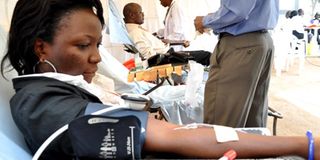Low response to donation drive causes blood shortage

The response to blood donation among adults is low as many have not embraced the spirit of volunteering. Photo by Rachel Mabala.
Limited supply of blood in Africa is a serious problem. According to the World Health Organisation, out of the 75 countries that report fewer than 10 donations per 1000 people, 38 of them are from Africa.
Only one per cent of Ugandans donate blood regularly. According to Dr Dorothy Kyeyune Byabazire the director Uganda Blood Transfusion Services (UBTS), the response from the adult community as regards donating blood is very low and this, among other factors has led to shortage of blood at the blood banks.
Speaking at the launch of the NSSF/UBTS nationwide blood donation drive at their offices in Nakasero, Dr Kyeyune highlighted that the blood banks rely mostly on school children more than the adults.
“Approximately 80 per cent of the blood donated is collected from pupils and students because they are easy to mobilize unlike the adults. This in turn causes a risk of shortage in supply during the long holidays,” she says.
She adds, “The response in the adult community is not as good as that from schools because most adults have not embraced the culture of voluntarism when it comes to donation.”
UBTS in partnership with National Social Security Fund kicked off a six-day blood donation drive starting on Monday February 1, to Saturday, February 6, at NSSF offices, Clock Tower, Worker’s House, Constitutional Square and at regional blood banks.
There are many unique circumstances surrounding blood collection that require urgent support. Uganda can only meet 240,000 units of blood yet the WHO recommends a country to have 340,000 units of blood (one per cent of the population).
The blood collected will be used in hospitals to save lives of anaemic malaria patients, pregnant mothers who may suffer complications during childbirth, cancer patients, sicklers, accident victims, and people requiring surgical procedures, among others.
Blood available at no cost
During the drive, Dr Kyeyune also emphasised that blood, like any other medicines, must not be sold to the patients and the caretakers should report anyone who sells the medicine.
“The problem is that people do not come out to report these cases but if anyone tells you to buy blood for any patient, immediately report that person because blood is free as people also donate it freely,” remarks Dr Kyeyune.
The central region is likely to feel the pinch of blood shortage despite having more people donate blood. This is because it has more than 100 hospitals that require blood so the region uses 400 units daily.
“There is no replacement for blood. People in the central region are more likely to suffer the shortage of blood since it has more hospitals that need the blood,” she says.
A person is eligible to donate one unit of blood that is equivalent to 450ml after every four months for women and three months for men.
The donor must be healthy (free from HIV and Hepatitis), not on medication, not menstruating, in the case of women and above 17 years of age with body weight of more than 45kgs.




